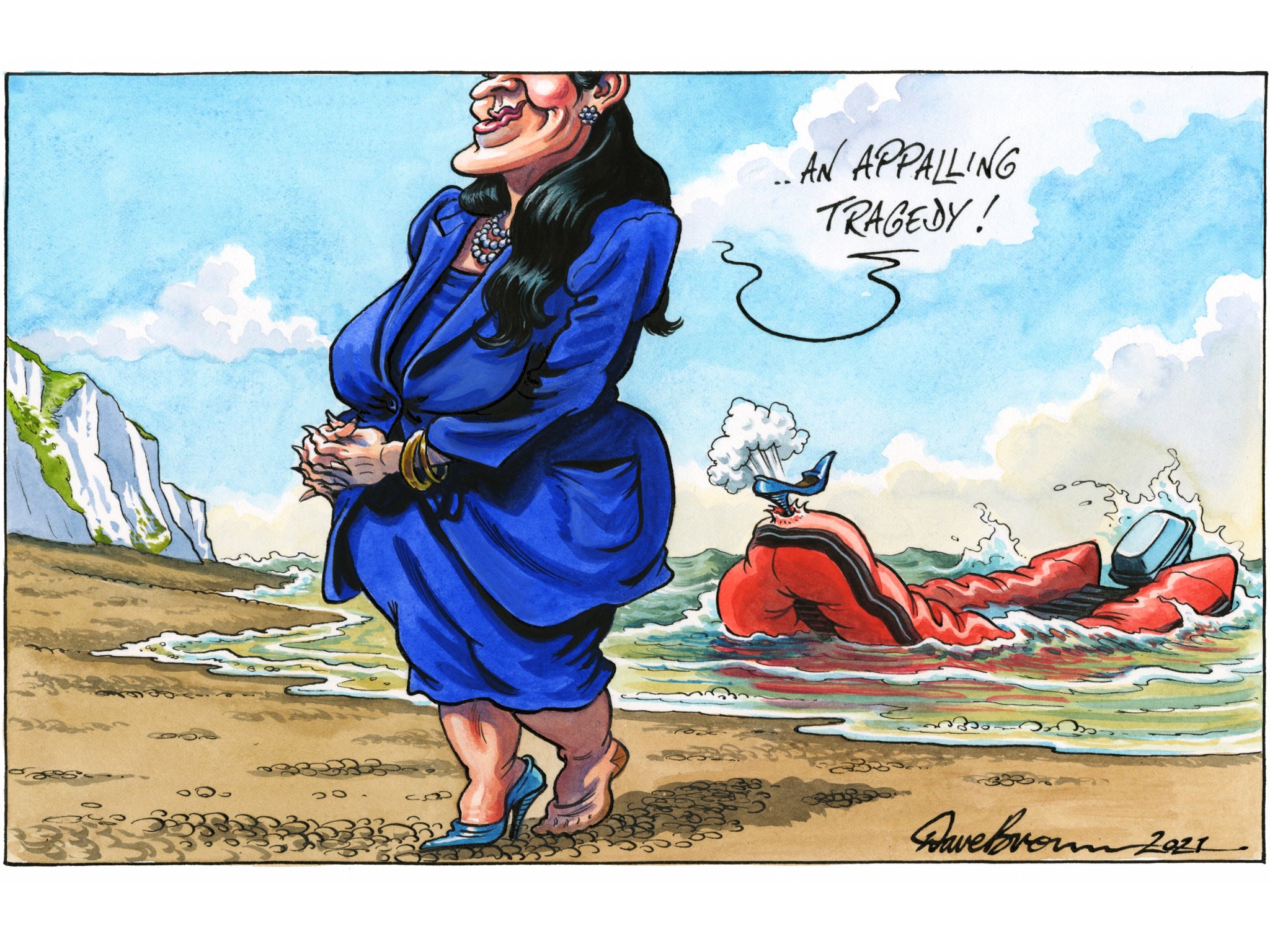Priti Patel needs to face facts – the risk of drowning is not enough to deter people from coming to Britain
Editorial: Unless the UK wants to withdraw from international treaties and suspend human rights for refugees, there is in fact no alternative to managing the people claiming asylum except to provide safe and orderly channels for them

In the circumstances, Priti Patel could hardly have been her usual aggressive, partisan, scornful self when she made her statement to parliament about the people who lost their lives in the English Channel.
When she was confronted by Jeremy Corbyn, she managed to keep her temper under control. She even agreed with another backbencher who pleaded with her to temper her language about such sensitive – and, too often, tragic – matters.
Yet she still couldn’t help herself. She talked about “burden sharing”, as if these people have nothing to give to society and are only set on taking as such as they can from the welfare state – the typical demeaning stereotype. She referred to the “illegal migrant crisis”, even though there is nothing illegal about anyone claiming asylum in any country at any time, even if their arrival might be irregular.
The right to asylum is a legal right under international law, whether the present home secretary likes it or not. Ms Patel is either not listening to the officials who have surely briefed her about the relevant UN and European conventions, as if these treaties will mysteriously amend themselves if she just keeps repeating the untruth, as if she were in a Harry Potter story.
Alternatively, she is deliberately persisting in using such dehumanising and inaccurate terms to undermine the whole concept of refugee status. Either way, it’s a disgrace to her office. She should know better, and probably does.
More disturbing still, apart from some platitudes and a spot of cross-channel blame throwing, Ms Patel actually had nothing constructive to offer. She has much faith in her new Nationality and Borders Bill, but it is not yet law, and there’s little reason to think it will break the business model of the people smugglers.
She rules nothing out, and nothing in. This is hardly reassuring, when one of the measures she still seems keen on what are called “boat turnarounds”, which is the kind of high-seas manoeuvre that could result in more pregnant women drowning in the English Channel.
She talks about drones and she’s offering the French the chance to have British officers and patrol boats in French waters and on the 200km-long north French coast. Magnanimously, she has also offered the French and the EU a “returns” agreement; something of a one-way deal first suggested during the Brexit talks and politely declined.
Ms Patel, a spirited Brexiteer, should at least acknowledge that, outside the bloc, the EU has no special reason to assist the UK with its migration problems. Even if the EU and France did agree a returns policy, though, there’s no reason to believe that people would still not attempt again and again to get to England.
Logically, it is in the French interest, on this view, to reduce the attractiveness of Calais as a base to escape to Britain, because it would reduce the flow of desperate people staying around north France. Yet, for their own reasons, the French have rejected the ideas Ms Patel has put forward, and there is nothing she can do about it.
At least in the EU a British minister could appeal in the council of ministers, make a case and forge alliances and make policy across a wider group of European leaders.
After Brexit, there are only angry words, and Britain has no influence – let alone power. The chimera of sovereignty and the false promise of “taking back control” of borders are the facts of post-Brexit life.
Unless the UK wants to withdraw from international treaties and suspend human rights for refugees, there is in fact no alternative to managing the people claiming asylum except to provide safe and orderly channels for them.
The risk of drowning is not enough to deter them, and neither will drones or patrol boats. Even if all benefits, accommodation and assistance to the refugees were withdrawn they would still come to Britain.
The pull factors are to do with the English language, family links and a better chance to work – not £39 a week for subsistence. There is nothing that can be done to combat these powerful and fundamental pull factors.
In the final analysis, though, it is the push factors – fleeing war, persecution or starvation – that drive people into the hands of the people smugglers. That is why a million Syrian people ended up in Germany and Sweden (and not many in Britain). Before the war, there was minimal migration out of Syria, no matter how prosperous life in the west might be; but when the bombs fell the people fled.
There is simply an almost inexhaustible supply of refugees from war zones across the world. Britain has an obligation, moral and legal, to take many of them in, but politically cannot accept all who wish to settle.
It would help the formation of a saner, more compassionate and safer asylum policy in the UK if the country stopped pretending that the people in the dinghies are all really bogus asylum seekers and economic migrants, and can be legitimately returned home.
The problem is actually that so many claims are genuine and irrefutable. It is an inconvenient truth for all.






Join our commenting forum
Join thought-provoking conversations, follow other Independent readers and see their replies
Comments